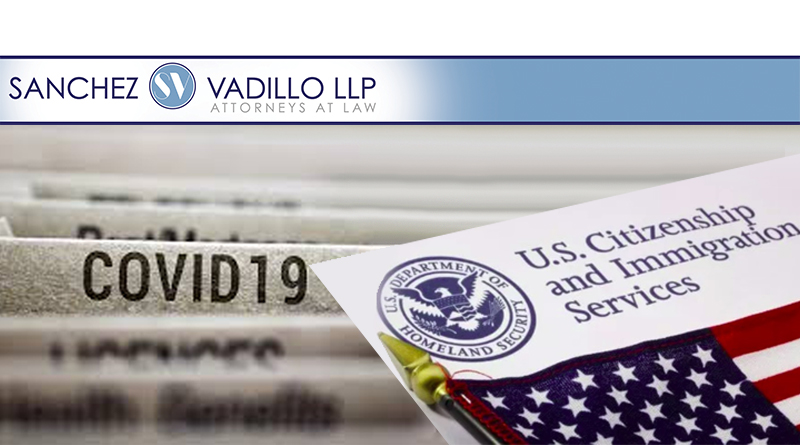Immigration news during the COVID-19 pandemic
By: Elizabeth Méndez Salom, Esq.
Attorney at Law | Sanchez Vadillo LLP
11402 NW 41st St, Suite 202
Doral, FL 33178
Ph: (305) 436-1410
Email: emendez@svlawus.com
It is hard to resume in short lines the changes and the impact that the recent government announcements regarding to immigration will have. All of these announcements were made during the COVID-19 pandemic. However, we will try to highlight the most important aspect of these announcements.
Tourists in USA during COVID-19 pandemic
There are a lot of tourists in USA who cannot come back to their residence country due to the fly suspension related to the COVID-19 pandemic. For some of them the length of time allowed to stay, according to the U.S Customs and Border Protection (CBP), could expire soon. The tourists should leave the country on the departure date indicated in the I-94 form. If you could not return to your country, you need to apply for an extension with the U.S Citizenship and Immigration Services (USCIS).
Applicants must file Form I-539 with USCIS before the expiration of their stay. This application must include evidence showing the reasons that justify their Application. Form I-94 must be attached. The evidence should include official notices about the COVID-19 pandemic and fly suspensions notifications. USCIS will evaluate each case and make a decision. It is important to file this application before the expiration date indicated in the Form I-94 to avoid accruing unlawful presence in the United States.
How to get the I-94 form
Previously, CBP officers stamped the expiration of the stay in one of the passport pages. Nowadays the visitors should check this date online in www.cbp.dhs.gov and complete the form with personal information. This process is completely free and only takes a few minutes. If you cannot get your I-94 form through the website, you need to contact the USCIS and ask for your form.
It is very important that a visitor get this form to know the expiration of their status and keep a record of admission to United States. Also, this information will be required when you need to apply for an extension or a change of your legal status.
Presidential Proclamation
On June 22nd, 2020 the President of the United States extended the presidential proclamation issued on April 22nd, 2020, which suspend the entry of any individual seeking to enter the U.S. as a permanent resident. The executive order was extended until December 31, 2020, and affects all the persons outside US that do not have an US residence. These persons cannot continue their application during the next six months. Additionally, this order suspends all the applications related to H-1B, H-2B, J, and L visas.
Who is NOT included in the proclamation?
-Those that have already applied or will apply for adjustment of status in the U.S.;
-Lawful permanent residents (LPR);
-Non-immigrant visa holders and applicants;
-Physicians, nurses, or other healthcare professionals coming to perform work essential to combating, recovering from, or otherwise alleviating the effects of the COVID-19 outbreak;
-EB-5 immigrant investors;
-Spouses of U.S. citizens;
-Children of U.S. citizens under the age of 21;
-Individuals who would further important U.S. law enforcement objectives (as determined by DHS and DOS);
-Members of the U.S. Armed Forces and their spouses and children;
-Individuals and their spouses or children eligible for Special Immigrant Visas as an Afghan or Iraqi translator/interpreter or U.S. Government Employee (SI or SQ classification);
-Individuals whose entry would be in the national interest (as determined by DOS and DHS); and;
-Asylum seekers.
SEVP Modifies Temporary Exemptions For International Students
Due to COVID-19, the Student and Exchange Visitor Program (SEVP) approve a temporal exemption related to online courses for the spring and summer semesters. This policy allows international students take more online course that usual to keep their nonimmigrant status during the COVID-19 pandemic.
On July 6, the SEVP announced changes in this temporal exemption for the next autumn semester 2020, eliminating the possibility for the international students of taking a full online course.
In response to these changes, on July 8, Harvard University and MIT universities filed a lawsuit against ICE and DHS in a Massachusetts federal court, requesting that the application of such regulations be prohibited and declared illegal. On July 14, Trump’s Administration rescinded the new policy in agreement reached by the Universities and the Federal Government.
If you are not sure if this proclamation or changes apply to you or your case, contact your attorney.

